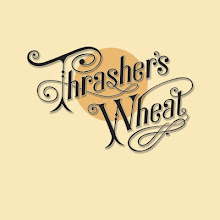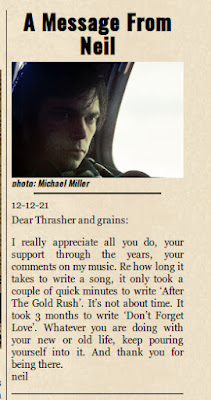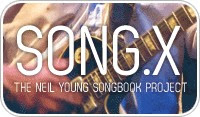Southern Man and Northern Man: Ronnie and Neil, The Un-Civil Wars & Rebels with Causes

Lynyrd Skynyrd's Ronnie Van Zant wearing a Neil Young "Tonight's The Night" T-shirt
Oakland Coliseum Stadium, July 2, 1977
Photographer: Michael Zagaris on Wolfgang's Vault
As today's un-Civil Wars continue to heat up and totally eclipse what really matters, all sorts of scapegoats are being dragged out of closets in futile attempts to distract, distort, entrain and inflame.
Everyone -- it seems -- has an opinion. Everyone is an expert. Everyone has the right solution.
So along comes the following article The Problem with Southern Rock by Barney Hoskyns, author of Hotel California: Singer-Songwriters & Cocaine Cowboys in the L.A. Canyons.
The hideous events unfolding in the U.S. over the past week prompted me to dig out this Guardian piece from April 2012. Titled Titled “Southern rock’s passion and romance is marred by racism and bigotry”, the article served as a preview to James Maycock’s BBC4 southern-rock doc Sweet Home Alabama. Here’s praying a few more southern rockers (and country singers, for that matter) stick their heads over the parapet and condemn Trump’s revolting collusion with racists and neo-Nazi supremacists. Even if Alabama is their sweet white homeland.The theory that music has been used to further divide the races is not a unique idea -- one which even Bob Dylan affirms is the reality. Rock ‘n’ roll was racially integrated in the 1950's until becoming commercially segregated in the 1960's into white (British Invasion Beatles and Rolling Stones) and black (soul, James Brown) music.
...
Was Skynyrd’s anthem of the same name a song of defiant pride cocking a snook at Neil Young’s ‘Southern Man’ (not to mention his ‘Alabama’) or was it something much worse – a strutting defence of old Confederate values, complete with egregious tip of the Stetson to segregationist governor George Wallace? ‘Sweet Home Alabama’ was and is a stonking song but Ronnie Van Zant wanted it both ways: to be both a bourbon-chugging rock rebel and the Yankee-baiting bigot that Young was decrying.
“Those of us who have characterized [Van Zant] as a misunderstood liberal,” wrote Mark Kemp – one of Maycock’s interviewees – in his excellent Dixie Lullaby: A Story of Music, Race, and New Beginnings in a New South (2004), “have done so only to placate our own irrational feelings of shame for responding to the passion in his music.”
...
“To the young white Southerner, black music always appealed more than white pop music,” Walden, who died in 2006, told me. “Certainly the Beach Boys’ surfing stuff never would have hacked it in the South. It was too white and it just wasn’t relevant. The waves weren’t too high down here.”
Sweet Home Alabama doesn’t shirk the regrettable fact that Southern Rock was born partly of the deepening racial divide that opened up after the 1968 assassination – in Memphis, of all the musical places – of Martin Luther King. “By the end of the decade, a lot of the results of the civil rights era had served to urbanise black music,” Walden said in my 1985 interview with him. “A lot of the people we had considered friends were suddenly calling us blue-eyed devils.”
Following Duane Allman’s stinging slide-guitar cameos on landmark tracks by Clarence Carter and Wilson Pickett, the racial cross-pollination of the southern soul era in Alabama hotspot Muscle Shoals (namechecked in Skynyrd’s ‘Sweet Home’) came to a shuddering halt. Black music got blacker while white southern rock went back to its first principles of melding country music with rhythm ‘n’ blues.
“In a sense the evolution of Southern rock was a reactionary attempt to return rock ‘n’ roll to its native soil,” suggested the Texan writer Joe Nick Patoski. “After the decline of interest in rockabilly, white rock in the South had taken a back seat to country & western and soul.”
AARP - February/March 2015
For our longtime, regular readers, you know that the subject of Ronnie VanZant and Neil Young is quite dear to us. We have delved into the subject ad infinitum so many, many , many times before.
So, long time Thrasher's Wheat readers, please bear with us about one little factoid that our less frequent readers may not know about us.
"Well, I hope Neil Young will remember
a southern man don't need him around anyhow"
a southern man don't need him around anyhow"
Growing up in the American South in the 1970's as a Neil Young fan wasn't exactly easy. It seems as if all of our life that whenever the subject of musical tastes came up and we revealed our appreciation of Young's music, almost invariably it was met with those lines above from Lynyrd Skynyrd's "Sweet Home Alabama" -- or worse, as in, the punches came fast and hard, lying on our back in the school yard, just to be blunt about it.
You see, Lynyrd Skynyrd's "Sweet Home Alabama" is more than just an anthem for many -- it serves as a statement for a way of life that is intensely protected such that when threatened -- it can produce some very uncomfortable results.
"Sweet Home Alabama", written by Lynyrd Skynyrd partially in response to Young's "Alabama" and "Southern Man" contains the apocryphal line: "I hope Neil Young will remember, a Southern man don't need him around anyhow". In his recent book Waging Heavy Peace, Young writes of his "Alabama" lyrics:
"I don't like my words when I listen to it today. They are accusatory and condescending, not fully thought out, and too easy to misconstrue."It would seem that hardly a day goes past, where we come across a blog post, Facebook status update or tweet, that attempts the "Neil Young putdown" without seeming comprehension of the context or the true story of Lynyrd Skynyrd and Neil Young.
For us, understanding the fascinating backstory of Ronnie and Neil and laying to rest the "Feud Myth" has proved to be quite challenging in these polarized times. But to know the full story is to know the true meaning of "Powderfinger". To know what is the color when black is burned. To know a trip isn't a fall.

The Life and Times of an Unlikely Rock and Roll Anthem
by Jonathan Bernstein
(Please note that instead of the stars and bars, the stars have been replaced by hearts, ok?)
Which brings us to the actual news that Lynyrd Skynrd have taken a stand and denounced the Confederate flag. In the CNN clip from 2012, Gary Rossington, says that the band, recognizing the stars-and-bars flag's offensive and racist undertones, will cease using it as a stage decoration at concerts supporting its new album "Last of a Dyin' Breed."
So what could be the possible problem with what seems to be enlightened 21st century thinking? Well, it turns out that this decision has angered their fan base. Really. From Lynyrd Skynrd denounces Confederate flag, angering some fans - latimes.com by August Brown:
"Through the years, people like the KKK and skinheads kinda kidnapped the Dixie or Southern flag from its tradition and the heritage of the soldiers, that's what it was about," Rossington said. "We didn't want that to go to our fans or show the image like we agreed with any of the race stuff or any of the bad things." This apparently didn't sit well with some of the band's fans back in Dixie, who have taken to the comments section with pained vitriol. "Good luck with your next release 'Sweet home Massachusetts.' I am sure it will climb the charts with a bullet in Yankee-land," said one. "This isn't the real Lynyrd Skynyrd anyway. They should have taken a name like 'Obama's Politically Correct Sell Your Soul Make Believe Impostors' or something," opined another.Somewhere, Ronnie is still having a good laugh at Alabama officials and Neil Young bashers. Such is the duality of the southern thing.

G. D. Smith: It's a shame that instead of hiding the battle flag out of political correctness, they didn't attempt to help educate the public about the rich history and heritage of the South. The last time I saw a story about the KKK, they were flying the Stars & Stripes. Yet in almost every picture you showed of LS in concert, they had Old Glory out there on stage. Does that mean they're now KKK members? Of course not. But by ignoring and denying the flag that is part of their history, they are leaving a large segment of their fan base behind as well. It's a shame that money is now more important than honor and heritage.
L R Stover: So y'all admit during the interview that the Confederate Flag represents history, heritage and the Confederate soldier, then you stop flying it because some misinformed people equate the flag with racism instead of continuing to educate people on our Southern symbol? Quoting Johnny Van Zant, "We speak for our fans, we speak for ourselves." Well, you just lost a significant portion of your fans so continue to speak for yourself. Good luck with you next release.."Sweet home Massachusetts." I am sure it will climb the charts with a bullet in yankee-land.
Paul Cox: It's hilarious to me that old school Lynyrd Skynyrd fans conveniently gloss over the fact that the original band was actually left-leaning (they campaigned hard for Carter in 1976, wrote a pro-gun control song called "Saturday Night Special"). It's only after the replacements came in that they started spoonfeeding their conservative fanbase exactly what they wanted. The confederate flag may mean heritage to some people, but I grew up in Alabama and I know what it really means. It means that there was a point in history that states were willing to go to war with the union over the right to own human beings.


Labels: lynyrd Skynyrd, neil young, sweet home alabama


































 Human Highway
Human Highway
















 Concert Review of the Moment
Concert Review of the Moment





 This Land is My Land
This Land is My Land

 FREEDOM In A New Year
FREEDOM In A New Year









 *Thanks Neil!*
*Thanks Neil!*




![[EFC Blue Ribbon - Free Speech Online]](http://www.thrasherswheat.org/gifs/free-speech.gif)











 The Unbearable Lightness of Being Neil Young
The Unbearable Lightness of Being Neil Young Pardon My Heart
Pardon My Heart



 "We're The Ones
"We're The Ones  Thanks for Supporting Thrasher's Wheat!
Thanks for Supporting Thrasher's Wheat!




 This blog
This blog 
 (... he didn't kill himself either...)
#AaronDidntKillHimself
(... he didn't kill himself either...)
#AaronDidntKillHimself








































































 Neil Young's Moon Songs
Neil Young's Moon Songs




 Civic Duty Is Not Terrorism
Civic Duty Is Not Terrorism Orwell (and Grandpa) Was Right
Orwell (and Grandpa) Was Right


 What's So Funny About
What's So Funny About 


